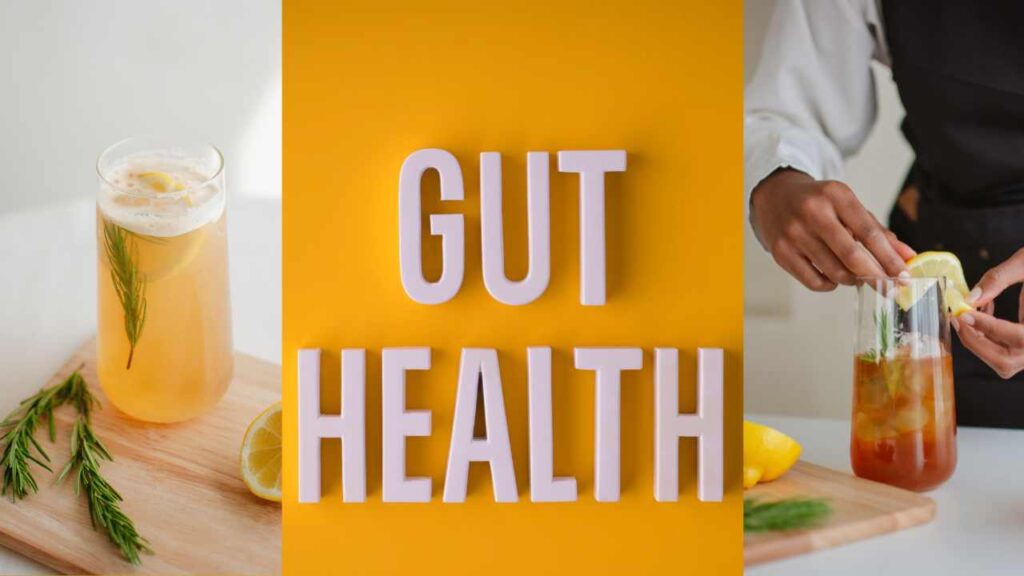In recent years, gut health has become one of the most talked-about topics in the world of wellness and nutrition — and for good reason. The human gut is home to trillions of microorganisms, collectively known as the gut microbiota, which play a crucial role in digestion, immunity, mood regulation, and even brain function. But did you know that what you eat has a direct impact on the health and balance of your gut?
From fermented foods to fiber-rich vegetables, your dietary choices can either support or disrupt your microbiome. In this blog post, we’ll explore which foods are scientifically proven to improve gut health, how they work, and how you can incorporate them into your daily routine.
What Is Gut Health and Why Does It Matter?
Gut health refers to the optimal functioning and balance of the gastrointestinal (GI) tract — a complex system responsible not only for digesting food and absorbing nutrients, but also for regulating the immune system and producing key neurotransmitters like serotonin.
A healthy gut includes:
-
Diverse gut bacteria (high microbial diversity is linked to better overall health)
-
Strong intestinal lining (prevents harmful substances from leaking into the bloodstream)
-
Efficient digestion and elimination
When your gut is out of balance — known as dysbiosis — it can contribute to:
-
Bloating, constipation, or diarrhea
-
Chronic inflammation
-
Food intolerances
-
Autoimmune diseases
-
Depression and anxiety
According to Harvard Health Publishing, there’s growing evidence linking gut health to mental health, further proving the gut-brain connection.
Foods That Promote Gut Health
Let’s explore the top food groups that can boost your gut microbiome and help you feel your best:
Probiotic-Rich Foods
Probiotics are live microorganisms that provide health benefits when consumed. They help balance your gut bacteria and improve digestion.
Top probiotic foods:
-
Yogurt (with live and active cultures)
-
Kefir – a tangy fermented milk drink
-
Sauerkraut – fermented cabbage
-
Kimchi – Korean fermented vegetables
-
Tempeh – fermented soybeans
-
Miso – fermented soybean paste used in soups
What Foods Help Gut Health?
Prebiotic Foods — Feeding Your Good BacteriaWhile probiotics are live “good” bacteria, prebiotics are the dietary fibers that act as food for them. Think of prebiotics as the fertilizer that helps your gut bacteria flourish.
What Are Prebiotics?
Prebiotics are non-digestible fibers found in certain plant-based foods. When they reach your colon, they ferment and stimulate the growth of beneficial gut bacteria like Bifidobacteria and Lactobacilli.Best Prebiotic Foods:
- Garlic
- Onions
- Leeks
- Asparagus
- Bananas (especially slightly green ones)
- Chicory root
- Jerusalem artichokes
- Oats
- Apples (with the skin on)
Evidence-based benefit: A 2020 study published in Nutrients (source) found that prebiotics not only increase healthy gut bacteria but also improve calcium absorption and mental health.
High-Fiber Whole Foods
Fiber is essential for gut health. It adds bulk to stool, supports regularity, and promotes the production of short-chain fatty acids (SCFAs) that nourish the gut lining.Best High-Fiber Foods for Gut Health:
- Legumes: Lentils, chickpeas, black beans
- Whole grains: Brown rice, quinoa, oats
- Vegetables: Broccoli, spinach, kale, carrots
- Fruits: Apples, berries, pears, oranges
- Nuts and seeds: Chia seeds, flaxseeds, almonds
According to the Cleveland Clinic, fiber not only prevents constipation but also fosters the growth of beneficial bacteria by acting as a prebiotic.
Fermented Foods — A Natural Source of Probiotics
Fermentation is the natural process where microorganisms break down sugars into acids or alcohol. This process increases beneficial bacteria and enhances digestibility.Popular Fermented Gut-Healthy Foods:
- Yogurt (plain, no added sugar)
- Kombucha – a fizzy tea with beneficial yeasts and bacteria
- Sauerkraut
- Kimchi
- Tempeh
- Natto – Japanese fermented soybeans rich in Vitamin K2
Fun fact: Fermented foods often provide enzymes and vitamins that are otherwise destroyed during cooking, aiding not only digestion but also nutrient absorption.
Polyphenol-Rich Foods
Polyphenols are plant compounds with antioxidant properties. They feed good gut microbes and help reduce inflammation.
Best Polyphenol Sources:
- Green tea
- Dark chocolate (70% cocoa or more)
- Blueberries
- Olive oil
- Red wine (in moderation)
- Turmeric
Research from the Journal of Nutritional Biochemistry (source) found that polyphenols increase beneficial bacteria like Bifidobacteria and Lactobacilli while suppressing harmful strains.
Healthy Fats & Lean Proteins
While gut health is often associated with fiber and fermented foods, the quality of fats and proteins you consume also matters.
Healthy Fat Sources:
- Avocados
- Fatty fish (like salmon, sardines)
- Extra virgin olive oil
- Nuts and seeds
These fats reduce inflammation and help maintain the integrity of the gut lining.Lean Protein Suggestions:
- Skinless poultry
- Lentils and legumes
- Tempeh
- Tofu
- Eggs
Bonus Tip: Avoid processed meats and excess saturated fats, as they may disrupt gut microbiota diversity.
Sample Gut-Friendly Daily Meal Plan
To help you integrate gut-boosting foods into your everyday life, here’s a one-day meal plan designed to promote digestion and nourish your microbiome.
Breakfast: Prebiotic & Probiotic Power Bowl
- Plain Greek yogurt (live cultures)
- Sliced banana (slightly green for prebiotics)
- Chia seeds + ground flaxseed
- Handful of blueberries (polyphenols)
- Drizzle of raw honey
Optional drink: Warm water with lemon + a dash of turmeric
Lunch: Fiber-Rich Grain Bowl
- Quinoa or brown rice base
- Steamed broccoli & kale
- Roasted chickpeas
- Avocado slices
- Olive oil + apple cider vinegar dressing
Bonus: Sprinkle with pumpkin seeds for zinc and gut-lining supportSnack: Fermented + Polyphenol Combo
- Small serving of sauerkraut or kimchi
- Green tea or kombucha
- Handful of almonds or walnuts
Dinner: Omega-3 Gut Healing Plate
- Grilled salmon (rich in anti-inflammatory omega-3s)
- Roasted sweet potatoes
- Sautéed garlic spinach
- Side of steamed asparagus (prebiotic-rich)
Optional dessert: Small piece of 70%+ dark chocolate with peppermint tea
Try to chew slowly, eat mindfully, and avoid excessive sugar, alcohol, and ultra-processed snacks — all of which can harm your microbiota.
Practical Tips for Supporting Gut Health Through Diet
Making gut-friendly choices can be simple and sustainable when you keep a few tips in mind:
Grocery Shopping Tips:
- Look for “live and active cultures” on yogurt and kefir labels
- Buy fresh vegetables and whole grains in bulk
- Choose fermented foods from the refrigerated section (shelf-stable ones are often pasteurized)
Storage & Prep:
- Store fermented foods in the fridge to preserve their probiotics
- Use airtight containers for fiber-rich grains and legumes
- Soak beans overnight for easier digestion
Smart Substitutions:
- Swap white rice with quinoa or farro
- Use hummus or avocado instead of mayo
- Replace soda with kombucha or infused water
Meal Prep Tip:
Prepare fermented and fiber-rich components (like roasted veggies, grains, legumes) in advance and store them separately so you can mix and match throughout the week.
Conclusion
Gut health is more than just avoiding bloating — it’s central to your immunity, mood, energy levels, and long-term well-being. By prioritizing prebiotics, probiotics, fiber, healthy fats, and polyphenols, you’re not just eating better — you’re cultivating a thriving internal ecosystem.From yogurt to oats, leafy greens to miso, the best foods for gut health are often simple, whole, and natural. Start small. Add fermented veggies to your meals. Drink more water. Snack on nuts. Over time, these habits can bring lasting change. Your gut is your second brain — feed it well.
FAQ
What is the fastest way to improve gut health?
Answer: Increase your intake of fermented foods, fiber, and water. Cut out processed sugars and artificial additives. Results can begin in as little as a week.
Are probiotics enough to improve my gut health?
Answer: Probiotics help, but they work best when combined with prebiotics and a high-fiber, balanced diet.
Is it okay to eat fermented foods daily?
Answer: Yes, for most people. Just start small (1–2 tablespoons) and increase slowly to avoid bloating.
Can gut health affect mental health?
Answer: Absolutely. The gut-brain axis means your gut health can influence mood, anxiety, and even depression. Harvard Health covers this in detail.
What foods should I avoid for a healthy gut?
Answer: Minimize:
- Sugary snacks and drinks
- Ultra-processed foods
- Artificial sweeteners
- Excess alcohol
- Red and processed meats
How much fiber do I need daily?
Answer: Adults should aim for 25–35 grams of fiber daily, according to the Mayo Clinic.









